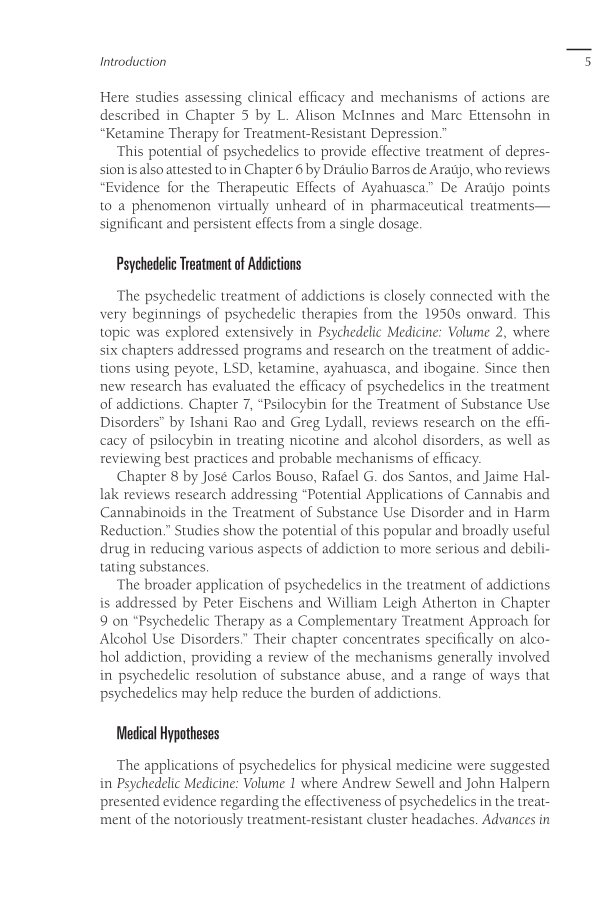Introduction 5 Here studies assessing clinical efficacy and mechanisms of actions are described in Chapter 5 by L. Alison McInnes and Marc Ettensohn in “Ketamine Therapy for Treatment-Resistant Depression.” This potential of psychedelics to provide effective treatment of depres- sion is also attested to in Chapter 6 by Dráulio Barros de Araújo, who reviews “Evidence for the Therapeutic Effects of Ayahuasca.” De Araújo points to a phenomenon virtually unheard of in pharmaceutical treatments— significant and persistent effects from a single dosage. Psychedelic Treatment of Addictions The psychedelic treatment of addictions is closely connected with the very beginnings of psychedelic therapies from the 1950s onward. This topic was explored extensively in Psychedelic Medicine: Volume 2, where six chapters addressed programs and research on the treatment of addic- tions using peyote, LSD, ketamine, ayahuasca, and ibogaine. Since then new research has evaluated the efficacy of psychedelics in the treatment of addictions. Chapter 7, “Psilocybin for the Treatment of Substance Use Disorders” by Ishani Rao and Greg Lydall, reviews research on the effi- cacy of psilocybin in treating nicotine and alcohol disorders, as well as reviewing best practices and probable mechanisms of efficacy. Chapter 8 by José Carlos Bouso, Rafael G. dos Santos, and Jaime Hal- lak reviews research addressing “Potential Applications of Cannabis and Cannabinoids in the Treatment of Substance Use Disorder and in Harm Reduction.” Studies show the potential of this popular and broadly useful drug in reducing various aspects of addiction to more serious and debili- tating substances. The broader application of psychedelics in the treatment of addictions is addressed by Peter Eischens and William Leigh Atherton in Chapter 9 on “Psychedelic Therapy as a Complementary Treatment Approach for Alcohol Use Disorders.” Their chapter concentrates specifically on alco- hol addiction, providing a review of the mechanisms generally involved in psychedelic resolution of substance abuse, and a range of ways that psychedelics may help reduce the burden of addictions. Medical Hypotheses The applications of psychedelics for physical medicine were suggested in Psychedelic Medicine: Volume 1 where Andrew Sewell and John Halpern presented evidence regarding the effectiveness of psychedelics in the treat- ment of the notoriously treatment-resistant cluster headaches. Advances in
Document Details My Account Print multiple pages
Print
You have printed 0 times in the last 24 hours.
Your print count will reset on at .
You may print 0 more time(s) before then.
You may print a maximum of 0 pages at a time.













































































































































































































































































































































































































